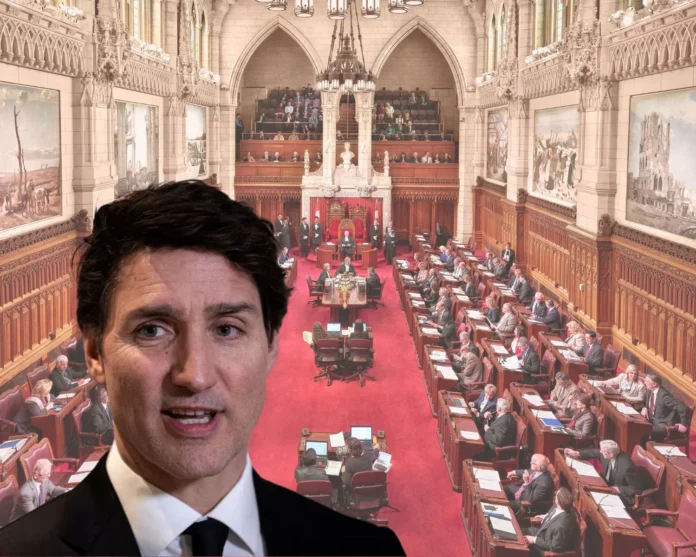Introduction
The final Senate vacancies in the 105-seat have now been filled, as five new appointments were confirmed just days before Prime Minister Justin Trudeau is set to leave federal politics. According to an official statement from the Prime Minister’s Office (PMO), the Governor General has appointed prominent figures from across Canada to occupy the remaining seats.
New Appointments to the Senate
As part of this latest round of appointments, the following individuals have been named to the Senate:
- Dawn Arnold – The former mayor of Moncton, representing New Brunswick.
- Tony Ince – A former Member of the Legislative Assembly (MLA) from Nova Scotia.
- Katherine Hay – A distinguished non-profit executive.
- Farah Mohamed – CEO of a renowned charitable organization.
- Sandra Pupatello – A former provincial politician from Ontario.
These appointments mark the completion of the Senate roster, ensuring that all seats are now occupied. The selection process, known for its transparency and focus on merit, highlights the importance of diverse representation in Canada’s upper house. Each appointee is expected to bring a wealth of experience and unique perspectives to parliamentary discussions.

A New Era in Senate Appointments
Since assuming office in 2015, Trudeau introduced a non-partisan, merit-based process for Senate selections. At the time, there were 22 vacant seats. Over the years, this reformed approach has led to 100 independent appointments, with 12 of those occurring in 2024 and 10 so far this year.
The new Senate selection process is designed to prioritize inclusivity, ensuring that individuals from various professional, regional, and cultural backgrounds are represented. By appointing professionals from diverse fields such as public service, business, and social advocacy, the goal is to create a more balanced and representative Senate that better reflects the Canadian populace.
Political analysts suggest that this approach has significantly changed the Senate’s role. Traditionally seen as a politically driven body, the institution is now shifting toward a more collaborative and evidence-based decision-making process, thanks to the influx of independent Senators.
The Impact of These Appointments
The completion of Senate appointments ensures that legislative work can proceed without delays caused by vacant seats. Each newly appointed member brings unique expertise and leadership experience, reflecting a broad range of backgrounds from public service, business, and social advocacy.
Observers suggest that this move aligns with the government’s ongoing commitment to fostering diverse representation and impartial decision-making within Canada’s upper house. As these newly appointed Senators take on their roles, their contributions will likely shape key policies and national discussions in the years to come.
Additionally, the Senate’s effectiveness in reviewing and refining legislation is expected to improve now that all seats are filled. Having a fully operational Senate will help accelerate discussions on pressing national issues, from economic reforms to social policies.
While some critics argue that this appointment process may lack direct accountability to voters, supporters emphasize that the merit-based selection process ensures that the most qualified individuals are chosen, regardless of political affiliation. This independence is seen as an essential step in reducing partisan bias in legislative decision-making.
What’s Next for the Senate?
With these new appointments, attention now turns to how the Senate will function moving forward. Some political experts speculate that greater autonomy and independence in Senate decision-making could lead to more rigorous scrutiny of government policies. Others believe that the continued evolution of the Senate’s role may eventually lead to calls for further reforms, such as changes to appointment procedures or the introduction of additional mechanisms for public oversight.
For now, the focus remains on ensuring a smooth transition for the new Senators as they take on their responsibilities. With a mix of experienced politicians, non-profit leaders, and business executives, the Senate is poised to contribute more effectively to shaping Canada’s legislative landscape.
Conclusion
With these five new appointments, the Senate now operates at full capacity, reinforcing Trudeau’s efforts to modernize and diversify Canada’s legislative landscape. As the Prime Minister prepares to exit federal politics, this final round of appointments leaves a lasting imprint on the country’s governance structure.
The independent Senate model, introduced during Trudeau’s tenure, is expected to continue shaping the future of Canadian politics. Whether this structure will remain in place under future administrations remains to be seen, but for now, these recent appointments mark a significant milestone in Canadian governance.
For further updates on political appointments and government affairs, stay connected with our latest insights and news analysis.


